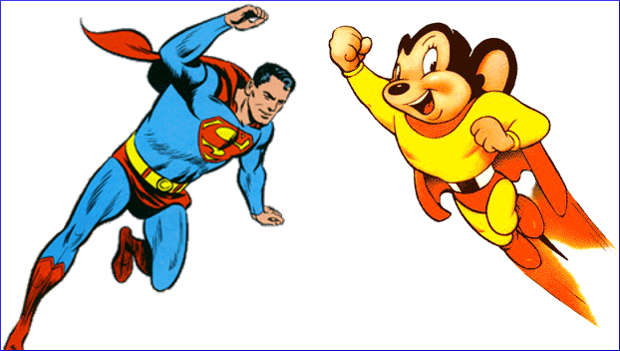Superman vs. Mighty Mouse? For suicide prevention, all super heroes are welcome

People struggling for survival don’t need research that pits antidepressants against psychotherapy, writes Dr. Greg Simon. They just need to get care that works for them.
By Greg Simon, MD, MPH, Group Health psychiatrist and GHRI senior investigator
In Rob Reiner’s classic film Stand By Me, 11-year old Vern asks his more mature friend Teddy, “Do you think Mighty Mouse could beat up Superman?” Teddy scornfully replies that “Mighty Mouse is a cartoon. Superman is a real guy!” Vern counters that “It would be a good fight, though!” In fact, Superman is no more real than Mighty Mouse. But Teddy is right that those two superheroes wouldn’t ever meet directly. They do their good deeds in completely different realms—or different television programs. Even if they did meet directly, we hope they would be on the same side. Nevertheless, Vern can’t resist imagining that epic battle.
An imaginary epic battle
In the field of suicide prevention, the most enduring (and most tiresome) epic battle is “Can psychotherapy beat up antidepressants?” Even though those two heroes ought to be on the same side, ardent fans can’t help pitting them against each other. But, like that epic battle between Mighty Mouse and Superman, the imaginary epic battle between psychotherapy and antidepressants doesn’t make much sense. It certainly won’t defeat the villains of depression or improve the lives of people living with mood disorders.
At Group Health Research Institute, we’re leading a study called the Mental Health Research Network Suicide Prevention Outreach Trial, which is evaluating the effectiveness of two population-based outreach programs. One includes systematic outreach to assess suicide risk and facilitate appropriate follow-up care. It follows the outreach and care management programs for mood disorders already proven effective in some health systems. The other uses “Now Matters Now,” an interactive online program—supported by an online “coach”—to teach specific skills from Marsha Linehan’s Dialectical Behavior Therapy. The trial will evaluate whether either intervention reduces risk of suicide attempt compared to usual care. But it will not directly compare the two programs to each other. We intentionally avoided setting up a fight between Mighty Mouse and Superman. We don’t view these programs (or the interventions they descend from) as competitors or mutually exclusive alternatives.
More superpowers
If we look at the broader landscape of interventions to prevent suicidal behavior, we see an even wider range of superpowers. At the most biomedical end of the spectrum lie intravenous infusions with experimental drugs like ketamine. At the most interpersonal end of that spectrum lie peer-delivered respite services as an alternative to traditional inpatient care. From a theoretical perspective, a contest between ketamine and peer support makes about as much sense as Mighty Mouse fighting Superman. They operate in different realms, and they certainly aren’t competitors or adversaries.
People who live with suicidal thoughts probably aren’t that interested in watching an epic battle between care management and Dialectical Behavior Therapy—or between ketamine and peer support. They’re just waiting for any viable superhero—or team of superheroes—to come along. As researchers helping health care providers develop the most effective care for individuals struggling with suicidal behavior, we should be happy to welcome Mighty Mouse, Superman, Wonder Woman, and any other heroes who are willing and able to stand by them.
Co-Researchers
,
Robert Penfold, PhD
Senior Investigator


